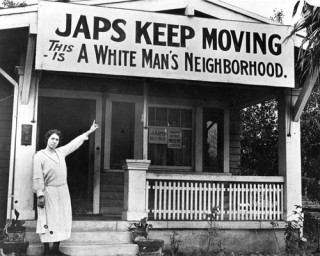A Prison Camp Memoir
Excerpts from another great memoir over on the JPRI site:
“The radio went dead. All the servants had long disappeared–stealing everything they could carry.
I locked all the doors and shutters and stayed in the dark. The planes were flying very low now, using the tramcar lines along the boulevard as a guide. When they opened up with their machine-guns, I guessed that the troops were near.
It was a long, long night. When dawn arrived, I couldn’t understand the sudden quiet, and ventured to the gate to look up to the main street. Imagine my astonishment when I saw thousands of troops marching softly past, carrying or riding bicycles! I learned later that 75,000 men entered Soerabaya that day.
I stayed locked in the house waiting for them to come for me, as I knew they would. It was dark before the hammering started on the door. I was terrified, but knew I had to hide it. So, carrying Jackie in my arms I opened the door. There were six storm troopers with fixed bayonets at the entrance. They pushed past me yelling for everybody to come out. They looked very tired, unshaven, hot and dirty and very violent.”
………….
“On a diet of rice and vegetable soup (a cup of each) three times a day, the casualties soon started to appear. The fat women seemed to show it first as they lost weight so quickly. The thin ones like myself lost weight, but it didn’t show so badly. Luckily I liked rice so had no trouble swallowing it. There were no eggs, meat, fruit or milk. We were allowed a spoon of sugar each per day.
The Japanese insisted that everything delivered as food went into the pot. There were no peelings, and even the greens of carrots were thrown in–but still there was not enough to go around. Many of the growing children were very hungry.
If it had not been so frightening it would have been interesting to see how quickly signs of malnutrition started to show–stomachs and ankles started to swell. Another inexplicable thing to me was that from the moment I was interned, until I was released I never menstruated once. Also although I ate exactly the same food, my ankles never swelled.
Soon dysentery swept through the camp and in the heat the smell was terrible, and of course people began to die. I was so grateful I had brought along Jackie’s pot, for we both used it throughout internment and didn’t catch dysentery.
I know how badly the men were treated in their camps, but I think the plight of the women has perhaps not been truly understood. They had their children to care for, and had to watch them go hungry. They were suddenly deprived of their wealth and position in society–and the aggravation amongst themselves was tragic to watch. Of course all classes were thrown together–we were only numbers now.”
………….
“Kimura ordered her out of the office and walked her to the middle of the compound, where everybody could see. It was dark, and I could only see shadows in the background. My legs felt weak and my stomach sick. He started to beat her up, and when I say “beat,” I really mean it. He slapped her about the face with his open hand until it started to look like raw beefsteak. All the time he was giving me a running commentary of what he was doing. Although swollen and raw no blood flowed from her face. He then hit her ears, carefully demonstrating to me how he cupped his hands to avoid breaking her eardrum. She was reeling from side to side until she fell unconscious to the ground.
He turned away as a cat from a dead mouse. She didn’t amuse him any more.
I called out for help after he had gone and a few women came out and helped me get her to the hospital. We were in luck for once. Earlier in the day I had interpreted for the doctor, who thought she had a diphtheria victim and needed ice. Surprisingly, we got some brought in and we now packed this over the woman’s swollen face. Just as Kimura had said, you couldn’t see a mark on her next day!”
………….
What an amazing story. This woman went through some crazy hardships and survived; go read the whole paper.


2 Comments
lirelou
If you found this interesting, you might enjoy a great Australian tellydrama made on this same subject, “A town like Alice”. It is available on VCR, and I assume DVD. Runs about six hours, with much of it flashbacks to Malaya where the heroine was imprisoned with a group of women and children by the Japanese, a few of whom were quite decent.
Justin
Thanks for the tip.